Editor:
Brandon Sweet
University Communications
bulletin@uwaterloo.ca
Remembering Anne Innis Dagg, the woman who loved giraffes
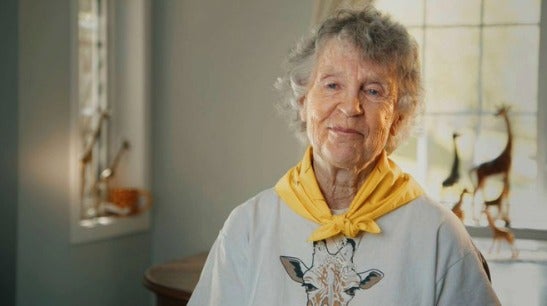
Retired professor Anne Innis Dagg passed away on Monday, April 1 at the age of 91.
She was the first western scientist to study giraffe behaviour in the wild in South Africa, and was a tireless advocate for gender equality in academia. Her remarkable record includes seminal contributions to the fields of animal biology, behaviour, and sociobiology, as well as tireless advocacy and analyses of misogyny and gender bias in academia.
Anne Christine Innis Dagg was born in 1933 to Harold Innis, the famous political economist and media theorist at the University of Toronto, and Mary Quayle Innis, author and economic historian. She completed an Honours Biology B.A. in 1955 and an M.A. in Genetics in 1956 at the University of Toronto.
In 1956, at the age of 23, she made a solo journey to South Africa to become the first western scientist to study animal behaviour in the wild on that continent, four years before Jane Goodall became famous for her work with chimpanzees and seven years before Dianne Fossey ventured into the mist-shrouded world of mountain gorillas. “Anne published her observations of giraffes in the journal Proceedings of the Zoological Society of London. “The Behaviour of the Giraffe, Giraffa Camelopardalis, in the Eastern Transvaal” (1958) was the first scientific article about an African mammal ever published,” states a 2019 profile published by Waterloo’s Faculty of Science.
She worked as a part-time lecturer at Waterloo Lutheran University (now Wilfrid Laurier University) in anatomy and physiology from 1962 to 1965, and then as an anatomy demonstrator at the University of Waterloo in 1966. In 1967 she earned her PhD in animal behaviour from the University of Waterloo. She taught zoology at the University of Guelph for four years as an assistant professor until 1972. She took on a research assistant professorship at Waterloo soon after, a position that, while making her eligible for national grants, did not come with a salary. While she continued her research in animal biology and behaviour, she also became an advocate for women's equality, highlighting the sexism and gender bias in academia that, in her view, had unfairly curtailed her own professional career.
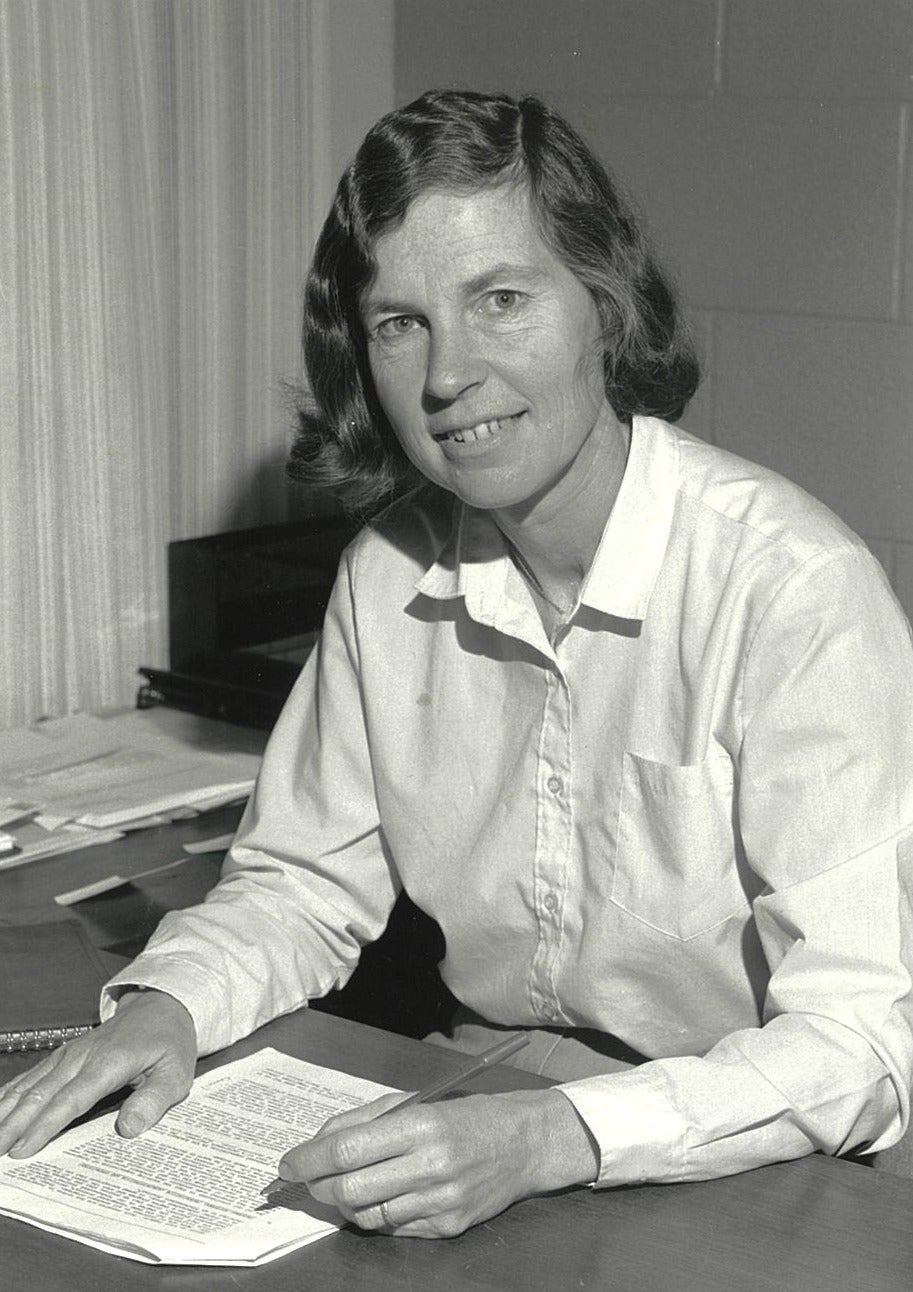 In 1981 she was hired as a resource person for Waterloo’s Integrated Studies program, which had launched in 1969 as an open-ended, self-directed, often interdisciplinary alternative to a conventional degree path. Dr. Innis Dagg became its academic director in 1986 after the program was renamed Independent Studies. “Independent Studies is a program that has any amount of possibilities,” Dr. Innis Dagg said at the time of her appointment. “The sky’s the limit.” After her appointment as director ended in 1989, Dr. Innis Dagg continued to work in Independent studies as Senior Academic Advisor for more than 25 years. The Independent Studies program was formally wound down in 2016. In 2016, she joined the Women's Studies (now Gender and Social Justice) program as an adjunct professor.
In 1981 she was hired as a resource person for Waterloo’s Integrated Studies program, which had launched in 1969 as an open-ended, self-directed, often interdisciplinary alternative to a conventional degree path. Dr. Innis Dagg became its academic director in 1986 after the program was renamed Independent Studies. “Independent Studies is a program that has any amount of possibilities,” Dr. Innis Dagg said at the time of her appointment. “The sky’s the limit.” After her appointment as director ended in 1989, Dr. Innis Dagg continued to work in Independent studies as Senior Academic Advisor for more than 25 years. The Independent Studies program was formally wound down in 2016. In 2016, she joined the Women's Studies (now Gender and Social Justice) program as an adjunct professor.
Dr. Innis Dagg was part of the Caravan of University Feminists, which was formed in 1990 to address the issue of sexism in Canadian universities, and presented a report to the Commission of Inquiry on Canadian University Education. She was also a member of the KW Status of Women organization.
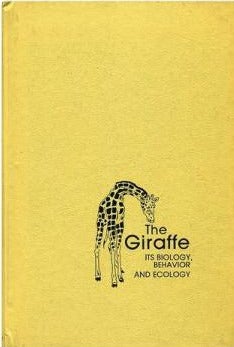
Dr. Innis Dagg published both scientific and popular works. Among her publications were the seminal textbook The Giraffe:Its Biology, Behavior, and Ecology andCamel Quest, written in 1979 and based on her research trips to study camel behaviour in Mauritania in the early 70s. She also published The 50 Per Cent Solution: Why Should Women Pay for Men’s Culture in 1986, and in 1988 co-authored MisEducation, Women and Canadian Universities with undergraduate student Patricia Thompson. In 2007 she published the memoir Pursuing Giraffe – A 1950s Adventure.
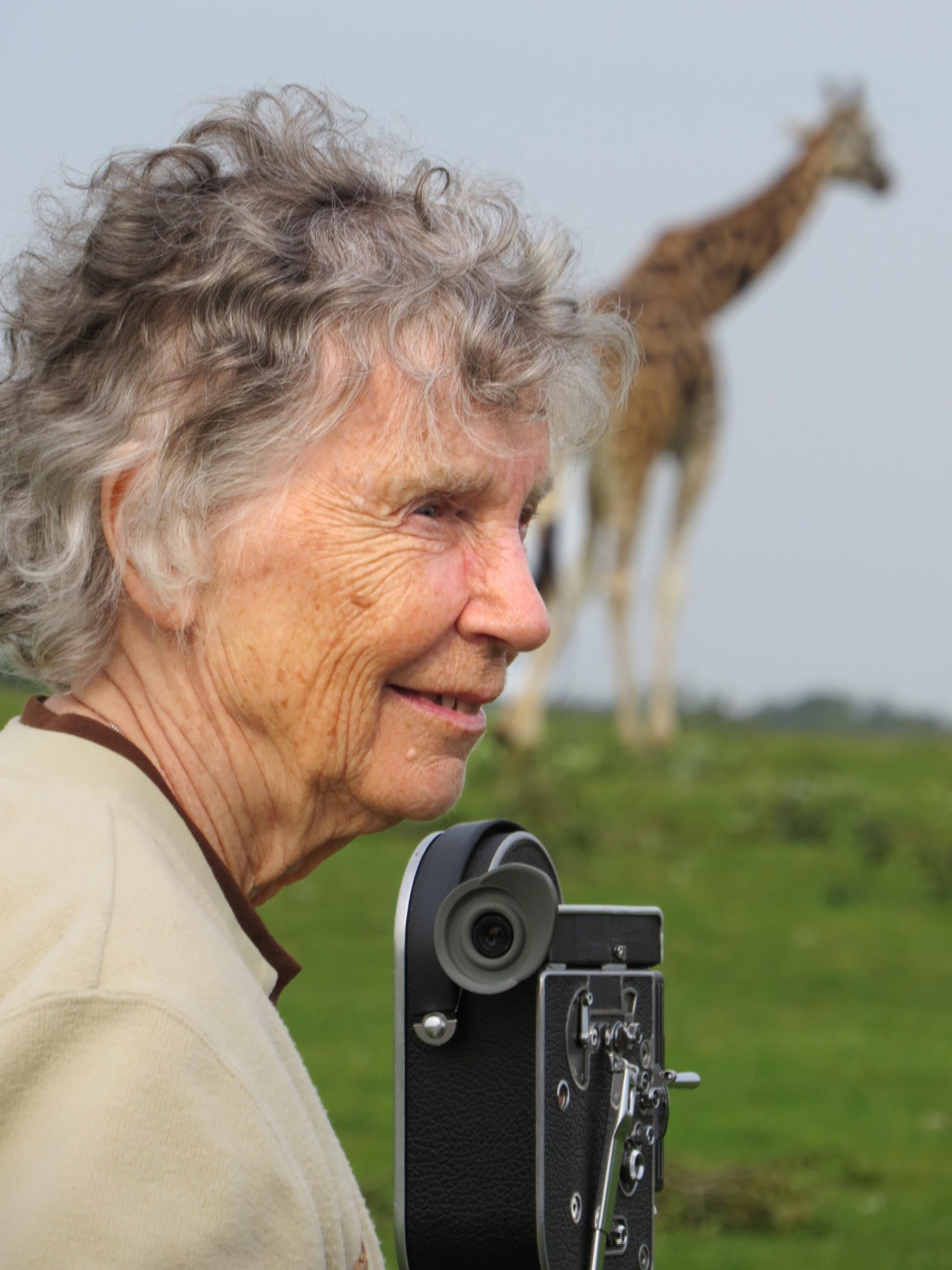
Dr. Innis Dagg became a fellow of the Zoological Society of Ontario in 1967, and was named one of eight top living female biologists in Canada for the National Museums of Canada’s "Why? Why Not? Exhibit" in 1975. She received the Batke Human Rights Award from K-W Status of Women in 1984. She was granted the Women of Influence Award by the Zonta Club in 2018. She received an honourary doctorate from the University of Waterloo in the fall of 2019 in recognition of her distinguished career in the fields of animal biology, behaviour and social biology. She was also named a Member of the Order of Canada in 2019. She received awards for her career contributions from several scientific societies and conservation groups, and was made an Honorary Member of the Canadian Society of Zoologists and an Honorary Lifetime Member of the Canadian Society for Ecology and Evolution. In 2022 she was recognized as one of Canada’s Most Powerful Women in the Women of Courage category by the Women Executive Network (WXN).
Widespread recognition of the importance of her work came later in life. Her solo overseas research adventures were recounted in the 2011 CBC Radio’s Ideas program “Wild Journey: The Anne Innis Story,” and the 2018 documentary “The Woman Who Loves Giraffes.”
In November 2022, Waterloo’s Faculty of Science hosted Dr. Innis Dagg for a conversation entitled Gender Discrimination in Academia Past to Present, which included a special exhibit in the Science Teaching Complex that highlighted her life and career entitled Musings of a Scientist, Feminist, Activist. The exhibit featured a selection of her poems and writings on women and science and a collection of artifacts associated with her career as a wildlife biologist and citizen scientist.
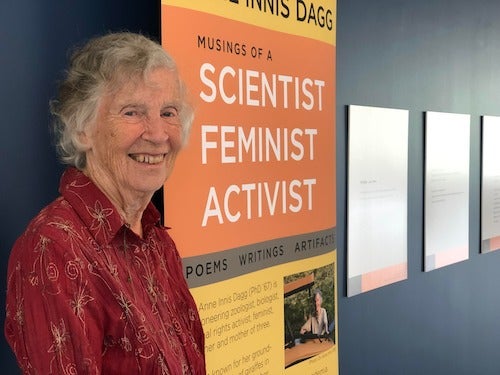
She was predeceased by her spouse Dr. Ian Dagg, a member of Waterloo’s Physics department from 1959 until his death in 1993, and long-time partner Dr. Alan Cairns of Waterloo’s Political Science department. She is survived by her three children and grandson.
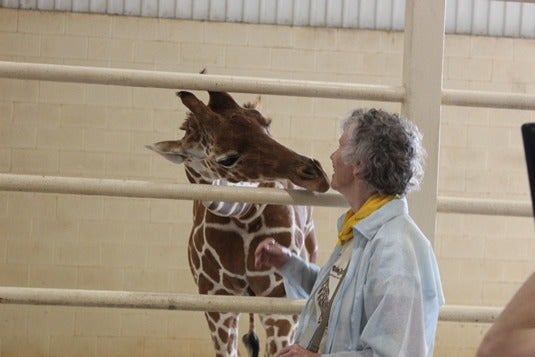
In accordance with her wishes there will be no funeral, but donations can be made in her memory to the Anne Innis Dagg Foundation.
Demystifying solar eclipses through math

By Paul McGrath. This is an excerpt of an article originally published on the Centre for Education in Mathematics and Computer (CEMC) website.
On April 8, 2024, the Moon's shadow will sweep across a relatively narrow strip of the Earth's surface. To be in the right place at the right time for such an event, a solar eclipse, is quite rare. Here in Waterloo, Ontario, we will be treated to a partial eclipse of the Sun during this event. However, one does not need to travel far from Waterloo (e.g., Niagara Falls) to get into the path of totality to observe a total solar eclipse. In the path of totality, the Moon will - if only for a few minutes - completely block out the Sun making it possible to observe the Sun's magnificent corona.
I stated above that it is rare to observe a solar eclipse and it is even more so to observe a total solar eclipse, but why is this? After all, a solar eclipse occurs when the Moon passes between the Sun and the Earth, so shouldn't this happen once every time the Moon orbits the Earth when we have a new moon? It's not quite this simple because the plane in which the Moon orbits the Earth is inclined relative to the plane in which the Earth orbits the Sun by about 5°5°. This means there is only an approximately 35-day interval, roughly every six months, during which eclipses can occur. We call these intervals eclipse seasons. This does, however, mean that there are two to three eclipses (including lunar eclipses) happening every eclipse season!
So, if solar eclipses are taking place at least a couple of times per year, then what makes observing a solar eclipse so rare? This has more to do with the size and nature of the shadow swept out by the Moon. Consider the following diagram illustrating the Sun illuminating space around the Moon.
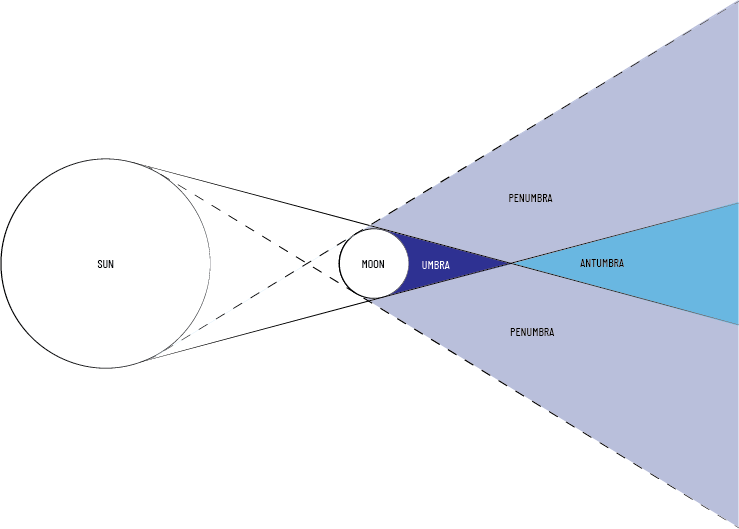
Since the Sun is not a point source of light, we can identify the region of space from which the Moon will completely block out the Sun by following the light rays emitted from the surface of the Sun along a path tangent to and on the same side of both the Sun and the Moon. In the two-dimensional representation above, there are two such lines but in three-dimensions, these rays enclose a conical region. The part of that region between the Moon and the vertex of the cone is called the umbra and this is where you must be to observe a total eclipse.
Read the full article on the CEMC website.
Map the System campus finals coming up
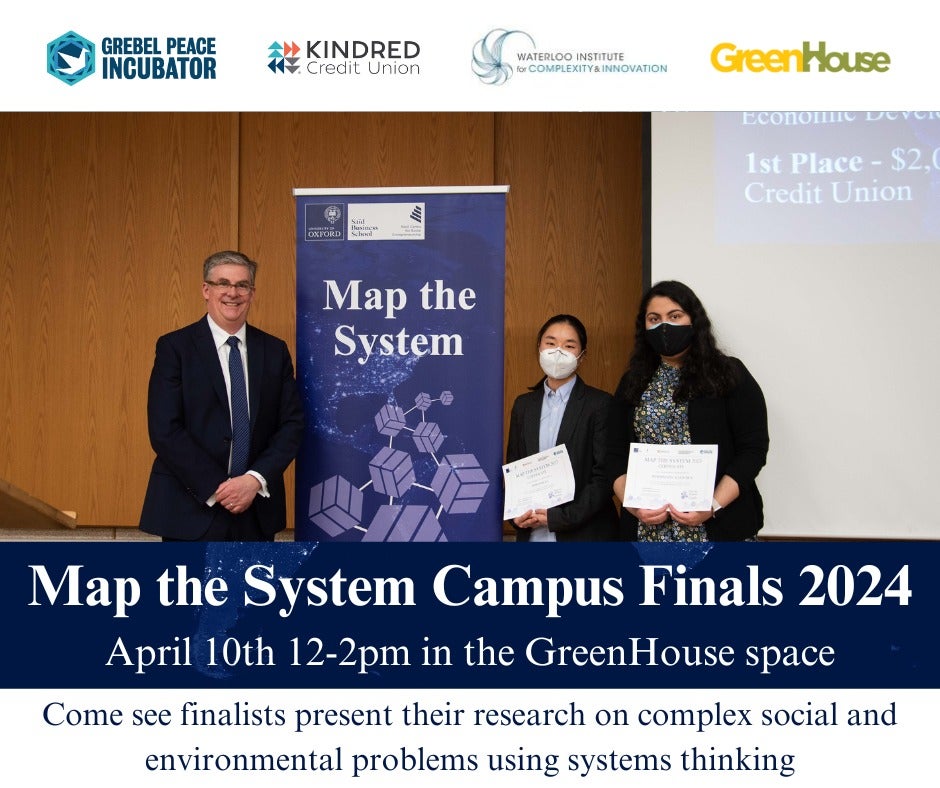
A message from GreenHouse.
Map the System Campus Finals are approaching! Five finalist teams from across UWaterloo will present their system maps that explore complex social and environmental problems as they compete for cash prizes. Map the System is a global competition run by the Skoll Centre for Social Entrepreneurship in partnership with Oxford University and other post-secondary institutions around the world. In this competition, participants use systems thinking as a guiding approach to explore some of the most complex issues facing the world today.
The finals take place from 12 noon to 2:00 p.m. on Wednesday, April 10 in the Green House space at United College. A light lunch will be provided. Register now.
End of Term Concerts and other notes
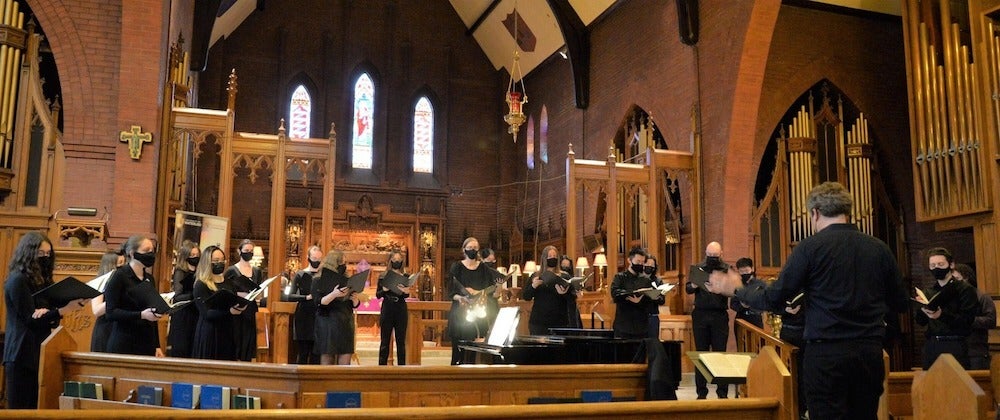
The Music department at Conrad Grebel University College is inviting all members of the University community to its ensemble end-of-term concerts this weekend:
- In the Night We Shall Go: Chamber Choir concert, Friday, April 5, 7:30 p.m., St. John the Evangelist Church, 23 Water Street, Kitchener, $5 students/$10 general, tickets available at the door.
Join the UW Chamber Choir for a centuries spanning program of music for the evening hours. The choir will be signing pieces composed by Francis Poulenc, Claudio Monteverdi, Samuel Barber, Canadian composers Eleanor Daley, laura Hawley, Imant Raminsh, and others. This term the Chamber Choir has been directed by Patrick Murray.
- Ad Astra: University Choir Concert, Saturday, April 6, 7:30 p.m., Trillium Lutheran Church, 22 Willow St., Waterloo. $5 students/$10 general, tickets available at the door
The UWaterloo Choir invites you to come to hear a wonderful evening of song and celebration. Featuring music by Diedrich Buxtehude, Johannes Brams, Elaine Hagenberg, Christopher Tin, and Eric Whitacre, the evening’s programme is sure to have a song for everyone! This 60-voice choir is directed by Liska Jetchick, and accompanied by Nicole Simone.
- The Jazz Journey: UWaterloo Jazz Ensemble, Sunday, April 7, 2:00 p.m., Conrad Grebel University College Great Hall, 140 Westmount Rd N. Free admission, reception to follow.
The Winter 2024 concert will feature composers who have contributed to this music’s unique history. Influences of Brazilian Samba, driven Big Band Swing, and the odd meter Jazz Waltz will be presented. A few of the composers contributing this term are Gordon Goodwin, Sammy Niehaus, Tito Puente, and Quincy Jones.
- Instrumental Chamber Ensembles concert, Sunday, April 7, 7:30 p.m., Conrad Grebel University College Chapel, 140 Westmount Rd N, Free admission, reception to follow.
A selection of music performed by 6 different chamber groups, with selected composers including Faure, Haydn, and Khachaturian.
Information Systems & Technology (IST) has published the latest in the Atlassian Blog Series, entitled Atlassian updates: Coming soon in Confluence.
Link of the day
Elmira Maple Syrup Festival celebrates 60 sticky years tomorrow
When and Where
The Student Health Pharmacy (located in the lower level of the Student Life Centre) is offering flu shots with no appointments needed daily from 9:30 a.m. to 3:30 p.m. Call 519-746-4500 or extension 33784 for more info. COVID shots will be available on appointment basis only. You can register online at studenthealthpharmacy.ca.
Warriors Youth Summer Camps. Basketball, Baseball, Football, Hockey, Multi-Sport and Volleyball. Register today!
Waterloo RoboHub Spring Career Fair, Friday, April 5, 9:00 a.m. to 4:00 p.m. Engineering 7.
Pivot-RP virtual training workshop for faculty members, postdocs and graduate students, Friday, April 5, 1:00 p.m. to 2:30 p.m., MS Teams. Please register to participate in the workshop.
Dean’s Distinguished Visiting Professor Lecture featuring Sanjeev Khanna, Henry Salvatori Professor of Computer and Information Science, University of Pennsylvania, “The Sublinear Lens and the Matching Problem,” Friday, April 5, 1:00 p.m., DC 1302 and Zoom.
Chamber Choir Concert: In the Night We Shall Go In, Friday, April 5, 7:30 p.m. to 9:30 p.m., St. John the Evangelist Anglican Church, Kitchener. Tickets are $5 students/$10 general admission.
Ad Astra: University Choir Concert, Saturday, April 6, 7:30 p.m., Trillium Lutheran Church, 22 Willow St., Waterloo. 5 students/$10 general.
The Jazz Journey: UWaterloo Jazz Ensemble, Sunday, April 7, 2:00 p.m., Conrad Grebel University College Great Hall. Free admission.
Instrumental Chamber Ensembles concert, Sunday, April 7, 7:30 p.m., Conrad Grebel University College Chapel. Free admission.
NEW - Lectures and classes end, Monday, April 8.
Equitable Recruitment and Selection, Monday, April 8, 1:00 p.m. to 2:00 p.m., online.
University Senate meeting, Monday, April 8, 3:30 p.m., NH 3407 and online.
NEW - Pre-examination study days, Tuesday, April 9 and Wednesday, April 10.
Brain Day 2024, Tuesday, April 9, Davis Centre.
WaterLeadership | Innovation Leadership Skills, with special guest Karen Kun, director and co-founder of Waterlution, Tuesday, April 9, 12 noon to 1:30 p.m., E2-2350.
Chemistry Seminar: PFAS and policy: Linking the chemistry of fluorinated gases with chemical regulations, Tuesday, April 9, 2:30 p.m., C2-361 Reading Room.
University of Waterloo Staff Conference, Wednesday, April 10 and Thursday, April 11.
Planning your research trajectory: Strategies for Success for researchers in the first three years of a tenure-track appointment, Wednesday, April 10, 10:00 a.m. to 12 noon, J.R. Coutts Engineering Lecture Hall – RCH 301. Please register to attend.
Building Statistics Canada’s water accounts with considerations for valuation, presented by Ann-Helen Jean-Baptiste and Mark Henry, water and ecosystem accounts, Environment, Statistics Canada. Part of the Water Institute's webinar series: The Value of Water in Canada, Wednesday, April 10, 12 noon.
Map the System Campus Finals, Wednesday, April 10, 12 noon to 2:00 p.m., GreenHouse space, United College. Register now.
NEW - Final examination period, Thursday, April 11 to Thursday, April 25.
Board of Governors meeting, Tuesday, April 16, 1:30 p.m., NH 3407 and Zoom.
Post-covid freedom discourses and their influence on the politics of climate intervention, Wednesday, April 17, 2:00 p.m. to 3:00 p.m., DC 1304.
IQC Public Lecture featuring Dr. Rajibul Islam, “Open Quantum Computing, One Atom at a Time,” Wednesday, April 17, 7:00 p.m., QNC 0101.
The Foundation: Building Inclusive Research Teams, Thursday, April 18, 10:00 a.m. to 11: 00 a.m. Register here.
Games Institute (GI) research symposium, “Disrupting Disciplinary Divides for Digital Futures”, Friday April 19, East Campus 1.
Earth Day Campus Clean-up, Monday, April 22, 11:00 a.m. to 1:00 p.m., supplies available at DC Green.
WISE Public Lecture, “Virtual Power Plants: Navigating through Foundational Concepts, Technologies Involved, Strategic Impacts, and Development Challenges” by Amir Miragha, (PhD, SMIEEE, Global Senior Principal Architect, Schneider Electric.), Monday, April 22, 1:30 p.m. to 2:30 p.m., CPH Fourth floor 4335., in-person and on Zoom. Register today!
Operating Budget Town Hall, Tuesday, April 23, 1:00 p.m. to 2:00 p.m., NH 3407.
NEW - Deadline to get "Fees Arranged," Wednesday, April 24.
NEW - An Evening with Astrophysicist Dr. Avery Broderick, Wednesday, April 24, 5:30 p.m. to 8:00 p.m., Federation Hall.
PhD oral defences
Economics. Zhuojing Zhang, "Essays on Empirical likelihood for Heaviness Estimation, Outlier Detection and Clustering." Supervisor, Dr. Tao Chen. Available upon request from the Faculty of Arts, Graduate Studies and Research Officer. Oral defence Wednesday, April 17, 9:00 a.m., remote.
Statistics and Actuarial Science. Zhaoran (Eric) Hou, "Sequential Monte Carlo for Applications in Structural Biology, Financial Time Series and Epidemiology." Supervisor, Dr. Samuel Wong. Thesis available from MGO - mgo@uwaterloo.ca. Oral defence Thursday, April 18, 1:00 p.m.
Psychology. Denise Law, "A Meta-analytic comparison of why workplace ostracism relates to discretionary behavior." Supervisor, Dr. Doug Brown. Available upon request from the Faculty of Arts, Graduate Studies and Research Officer. Oral defence Friday, April 19, 12:30 p.m., PAS 3026.
Geography and Environmental Management. Mina Rohanizadegan, “Evaluation of Wind Flows and Turbulent Fluxes in Complex Terrain of Canadian Rockies”. Supervisors, Dr. Rich Petrone, Dr. John Pomeroy. Available upon request from the Faculty of Environment, Administrator, Graduate Studies. Oral defence Wednesday, April 24, 10:00 a.m.